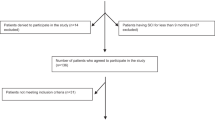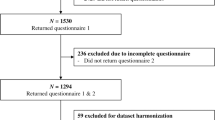Abstract
Study design
Retrospective analysis of medical records.
Objective
To assess personality traits in persons with spinal cord injury (SCI) and compare these with the general population group. Moreover, to explore associations between personality traits and depressive and anxiety symptoms among persons with SCI in first inpatient rehabilitation.
Setting
Specialized rehabilitation center in The Netherlands.
Methods
Data were used from a routine psychological screening, administered in the first weeks of admission (N = 67). Measures included the Hospital Anxiety and Depression Scale and the Dutch Personality Questionnaire, which includes subscales measuring neuroticism, social inadequacy, rigidity, hostility, egoism, dominance, and self-esteem. Correlational and regression analyses were conducted.
Results
Mean age of the participants was 58 (SD 17) years. The majority (63%) were male, and had a low lesion (57%). The participants scored significantly higher on dominance and lower on social inadequacy, hostility, and egoism in comparison with the general population.
In the bivariate regression analyses, high neuroticism (β = 0.42 and β = 0.53) and low self-esteem (β = -0.25 and β = -0.29) were significantly associated with increased depressive and anxiety symptoms. In the hierarchical regression analyses, only high neuroticism was significantly associated with increased depressive (β = 0.42, p < 0.05) and anxiety (β = 0.55, p < 0.001) symptoms.
Conclusions
Personality traits are not the same between the SCI population and the general population. Assessment of personality traits early in inpatient rehabilitation can help to identify individuals at risk of mood problems and, thereby, facilitate interventions. Future research with a larger, representative SCI sample, is required to confirm these findings.
This is a preview of subscription content, access via your institution
Access options
Subscribe to this journal
Receive 12 print issues and online access
$259.00 per year
only $21.58 per issue
Buy this article
- Purchase on Springer Link
- Instant access to full article PDF
Prices may be subject to local taxes which are calculated during checkout
Similar content being viewed by others
Data availability
The dataset analyzed during the current study is available from the corresponding author on reasonable request.
References
Post MWM, Van Leeuwen CMC. Psychosocial issues in spinal cord injury: a review. Spinal Cord. 2012;50:382–9.
Williams R, Murray A. Prevalence of depression after spinal cord injury: a meta-analysis. Arch Phys Med Rehabil. 2015;96:133–40.
Le J, Dorstyn D. Anxiety prevalence following spinal cord injury: a meta-analysis. Spinal Cord. 2016;54:570–8.
Consortium for Spinal Cord medicine. Management of mental health disorders, substance use disorders, and suicide in adults with spinal cord injury. Clinical practice guideline for health care providers. Washington, DC: Paralyzed Veterans of America; 2020.
Klein DN, Kotov R, Bufferd SJ. Personality and depression: explanatory models and review of the evidence. Annu Rev Clin Psychol. 2011;7:269–95.
Williams AL, Craske MG, Mineka S, Zinbarg RE. Reciprocal effects of personality and general distress: neuroticism vulnerability is stronger than scarring. J Abnorm Psychol. 2021;130:34–46.
Magee C, Biesanz JC. Toward understanding the relationship between personality and well‐being states and traits. J Pers. 2019;87:276–94.https://doi.org/10.1111/jopy.12389.
Kotov R, Watson D, Robles JP, Schmidt NB. Personality traits and anxiety symptoms: the multilevel trait predictor model. Behav Res Ther. 2007;45:1485–503.
Rohe DE, Krause JS. The five-factor model of personality: findings in males with spinal cord injury. Assessment. 1999;6:203–14.
Salter JE, Smith SD, Ethans KD. Positive and negative affect in individuals with spinal cord injuries. Spinal Cord. 2013;51:252–6.
Hatcher MB, Whitaker C, Karl A. What predicts post-traumatic stress following spinal cord injury? Br J Health Psychol. 2009;14:541–61.
Berry JW, Elliott TR, Rivera P. Resilient, undercontrolled, and overcontrolled personality prototypes among persons with spinal cord injury. J Pers Assess. 2007;89:292–302.
Van Leeuwen CM, Post MW, Westers P, Van Der Woude LH, De Groot S, Sluis T, et al. Relationships between activities, participation, personal factors, mental health, and life satisfaction in persons with spinal cord injury. Arch Phys Med Rehabil. 2012;93:82–89.
de Carvalho SAD, Andrade MJ, Tavares MA, de Freitas JLS. Spinal cord injury and psychological response. Gen Hosp Psychiatry. 1998;20:353–9.
Van Leeuwen CMC, Kraaijeveld S, Lindeman E, Post MWM. Associations between psychological factors and quality of life ratings in persons with spinal cord injury: a systematic review. Spinal Cord. 2012;50:174–87.
Kirshblum SC, Burns SP, Biering-Sorensen F, Donovan W, Graves DE, Jha A, et al. International standards for neurological classification of spinal cord injury. J Spinal Cord Med. 2011;34:535–46.
Zigmond AS, Snaith RP. The hospital anxiety and depression scale. Acta Psychiatr Scand. 1983;67:361–70.
Barelds DPH, Luteijn F, Van Dijk H. Dutch Personality Questionnaire - revised (Nederlandse Persoonlijkheidsvragenlijst-2-R). Amsterdam: Boom; 2014.
Ramakers IHGB, Honings STH, Ponds RW, Aalten P, Sebastian K, Verhey FRJ, et al. The effect of psychological distress and personality traits on cognitive performances and the risk of dementia in patients with mild cognitive impairment. J Alzheimers Dis. 2015;46:805–12.
IBM Corporation. IBM SPSS statistics for Windows, Version 26.0. Armonk, NY: IBM Corporation; 2019.
Eurelings-Bontekoe EHM, Snellen WM. Dynamic personality diagnostics (Dynamische persoonlijkheidsdiagnostiek). 4th ed. Amsterdam: Pearson; 2017.
Metts A, Yarrington J, Enders C, Hammen C, Mineka S, Zinbarg R, et al. Reciprocal effects of neuroticism and life stress in adolescence. J Affect Disord. 2021;281:247–55.
Wijenberg M, Van Heugten C, Van Mierlo M, Visser-Meily J, Post M. Psychological factors after stroke: are they stable over time? J Rehabil Med. 2019;51:18–25.
Mehta S, Rice D, McIntyre A, Getty H, Speechley M, Sequeira K, et al. Identification and characterization of unique subgroups of chronic pain individuals with dispositional personality traits. Pain Res Manag. 2016;2016:5187631.
Lykou E, Rankin KP, Chatziantoniou L, Boulas C, Papatriantafyllou O, Tsaousis I, et al. Big 5 Personality changes in Greek bvFTD, AD, and MCI patients. Alzheimer Dis Assoc Disord. 2013;27:258–64.
Geyh S, Kunz S, Müller R, Peter C. SwiSCI Study Group. J Rehabil Med. 2016;48:219–34.
Bonanno GA, Kennedy P, Galatzer-Levy IR, Lude P, Elfström ML. Trajectories of resilience, depression, and anxiety following spinal cord injury. Rehabil Psychol. 2012;57:236–47.
Jeronimus B. Environmental influences on neuroticism: a story about emotional (in)stability (PhD thesis). Groningen: University of Groningen; 2015.
de la Vega R, Molton IR, Miró J, Smith AE, Jensen MP. Changes in perceived social support predict changes in depressive symptoms in adults with physical disability. Disabil Health J. 2019;12:214–9.
Acknowledgements
The authors would like to thank the participating psychologists, psychology assistants, and participants of the study.
Author information
Authors and Affiliations
Contributions
CMCvL designed the study, collected the data, supervised the data analysis and writing of the report, and contributed to the writing of the report. EP analyzed the data and drafted the report. JMS-S collected the data and provided feedback on the drafts of the report. MWMP contributed to the data analysis and writing of the report. JWHvE provided feedback on the data analyses and the various drafts of the report.
Corresponding author
Ethics declarations
Competing interests
The authors declare no competing interests.
Ethics approval
We certify that all applicable institutional and governmental regulations concerning the ethical use of human volunteers were followed during the course of this research.
Additional information
Publisher’s note Springer Nature remains neutral with regard to jurisdictional claims in published maps and institutional affiliations.
Rights and permissions
Springer Nature or its licensor (e.g. a society or other partner) holds exclusive rights to this article under a publishing agreement with the author(s) or other rightsholder(s); author self-archiving of the accepted manuscript version of this article is solely governed by the terms of such publishing agreement and applicable law.
About this article
Cite this article
van Leeuwen, C.M.C., Papazoglou, E., van Eersel, J.H.W. et al. Associations between personality traits and depressive and anxiety symptoms among persons with spinal cord injury in first inpatient rehabilitation. Spinal Cord 62, 178–182 (2024). https://doi.org/10.1038/s41393-024-00964-z
Received:
Revised:
Accepted:
Published:
Issue Date:
DOI: https://doi.org/10.1038/s41393-024-00964-z



